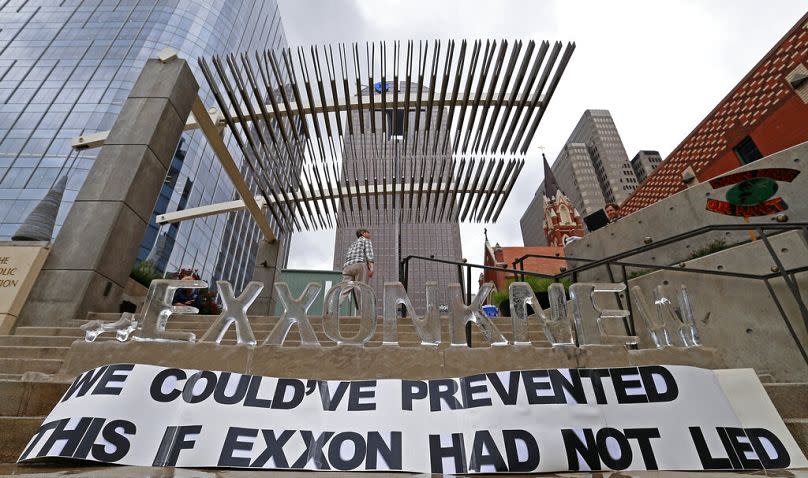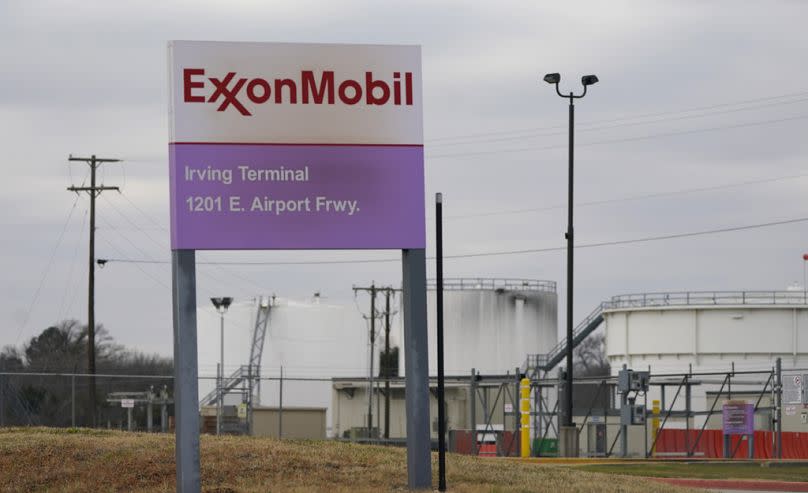Here’s how Big Oil repeatedly misled the public over their private downplaying of climate crisis

A damning new report has accused Big Oil of privately acknowledging its efforts to downplay the dangers of burning fossil fuels - while publicly stating they were opposed to the practice.
The report, headed up by the Democrats on the House Oversight Committee in the United States, says oil giants including ExxonMobil and Chevron - as well as several industry trade groups - were behind a campaign aimed at defending the industry's interests. They claim this has all been done at the expense of the planet.
"Big Oil has run campaigns to confuse and mislead the public while working unceasingly to lock down a fossil fuel future," Maryland Democratic Representative Jamie Raskin, who co-authored the report with Rhode Island Democratic Senator Sheldon Whitehouse, said.
"Big Oil continues to conceal the facts about their business model and obscure the actual dangers of fossil fuels, including natural gas, in order to block the climate action we need," he added.

The revelations have prompted Sharon Eubanks, a former federal litigator who won the case against Big Tobacco, to call on the US Department of Justice to pursue a conspiracy case against Big Oil to force it to change the way it does business.
What did the report reveal about Big Oil’s attempts to downplay the climate crisis?
The report was supported by documented evidence discovered by the US lawmakers. In it, decades-old analysis by oil industry scientists warning of climate change is presented.
Those warnings were found to have been cast aside in favour of industry communications that emphasised the apparent uncertainty around climate science.
The report revealed that, while there has been constantly increasing scientific consensus around climate change, many oil companies have taken an entirely different approach out of the public eye.
The committee claims that Big Oil leaders have and are still "denying climate science” as well as “spreading disinformation and perpetuating doublespeak about the safety of natural gas and the industry's commitment to reducing greenhouse gas emissions."
Their report also accused oil majors of using "confusing and misleading narratives", including the public backing of carbon capture technology while, in private, calling it prohibitively expensive without the existence of extensive government support.
The American Petroleum Institute (API) was also targeted by the report along with individual oil companies. It was found to have defended the industry's balance of environmental and economic priorities.
They and many major fossil fuel firms have publicly pledged support for international climate efforts - but it now appears that, behind closed doors, they’ve admitted such efforts are incompatible with their own plans.
“For decades, the fossil fuel industry has known about the economic and climate harms of its products but has deceived the American public to keep collecting more than $600bn [€562bn] each year in subsidies while raking in record-breaking profits,” Whitehouse, who chairs the committee, said.
How did the committee come to its conclusions about Big Oil?
The released documents come from an investigation that was launched in 2021 by the House Committee on Oversight and Accountability. It disbanded after Republicans took control of the chamber in 2022.
The documents, which are summarised in the report, come directly from big oil firms Exxon, Shell, BP and Chevron, as well lobbying organisations API and the US Chamber of Commerce.
They date back as far as 30 November 2015 - that’s just weeks before the signing of the Paris climate accord.
That year, journalists at Inside Climate News and the Los Angeles Times found that Exxon had been aware of the dangers of the climate crisis for decades - and yet hid that knowledge from the public.
Exxon, however, publicly rejected those claims outright, calling them “inaccurate and deliberately misleading”.
When chief executive Darren Woods was questioned by the House Oversight Committee in 2021, he said he did “not agree that there was an inconsistency” between what Exxon told the public and what their own scientists were warning in private.
In communications shared internally, though, it was clear this wasn’t the case.

According to an email sent in December 2015, Exxon communications advisor Pamela Kevelson was found to have admitted the company did not “dispute much of what these stories report”.
BP is also in hot water. In February 2020, the company announced plans to become a net zero emissions company by 2050 or sooner, as part of its apparent mission to “help the world get to net zero”.
Private emails released by the committee though found that top bosses had admitted they doubted that goal was achievable months earlier.
In 2019, BP also publicly opposed former president Trump’s plan to roll back an Obama-era regulation on methane emissions. In a private email, though, a BP executive was found to have said the controversial proposal was “aligned with our thinking”.
Shell also pledged to reach net zero emissions by 2050 back in 2016.
Two years later, however, the company’s external relations manager said they were doubtful the goal was achievable, suggesting it might instead take until 2060 or 2070.
The committee also found that, in a 2020 internal presentation about approved messaging on net zero emissions, Shell had instructed lobbyists and employees not to say that net zero was a “Shell target”.
What will these findings mean for Big Oil?
The committee suggests that fossil fuel companies have long sought to portray gas as a climate-friendly fuel, while simultaneously acknowledging behind closed doors that its use is not compatible with international climate goals.
Their findings come at a tricky time for Big Oil. The industry is currently facing an increasing number of lawsuits for allegedly lying about the dangers of using fossil fuels.
The city of Chicago, Pennsylvania’s Bucks county, Puerto Rico and the Shoalwater Bay Indian Tribe have all brought lawsuits. They have all also cited the previously subpoenaed documents unveiled by the House Oversight Committee as evidence of their claims.
“This is the most important thing that Congress is doing right now on climate change,” Richard Wiles, the president of the Centre for Climate Integrity, said.

